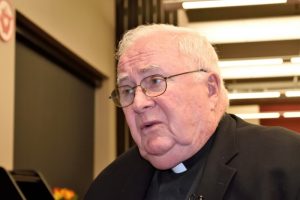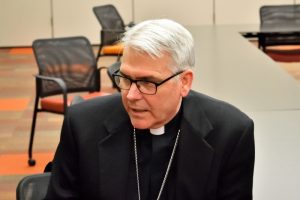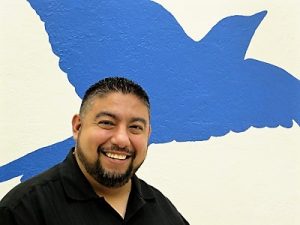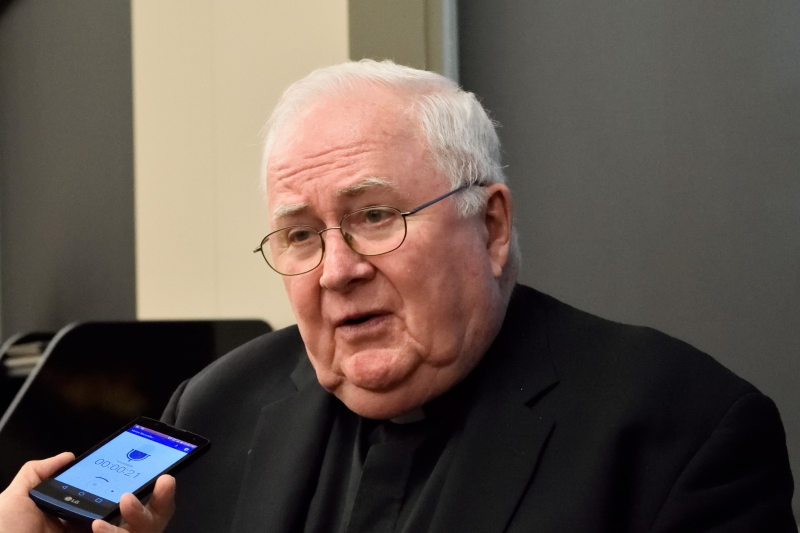Last Updated on December 14, 2016, 3:32 PM | Published: January 21, 2016
It’s a private school whose founder says, “If you can afford to come here, you can’t come.”
Roman Catholic Jesuit priest Fr. John P. Foley developed that line when he started the first Cristo Rey high school in Chicago in 1996. It was what he would say to families who had significant money and wanted their children to attend.

Most private schools find it necessary to seek students whose parents have financial means. Not only do they pay full tuition, but eventually they give even more. And so, the comment was and still is extraordinary. It is one of many signals that this is not your average Catholic school concept.
In a visit to Oklahoma City Jan. 20-21, Foley met with a feasibility committee of Catholic and community business leaders who have been working to start a Cristo Rey school in the metro. If the plan works, the city will see its first private school from a network that has needy students as its sole focus.
Needs-focused
From its first school in Chicago to a current network of 30+ schools, Cristo Rey is designed to give needy students a college prep experience and a work-study experience that has much support from the business community in cities where the schools operate.
Foley told Free Press during the visit that there is one overarching goal, which is “to save the talent that is being lost; to help those kids who don’t have a chance to go to college.”
When pressed on what the schools do to keep economically poor students from being edged out by students who come from families who can afford a private school, Foley simply said, “We won’t let them. You have to show your income.”
While there are many Catholic high schools that do a good job of college prep, the Cristo Rey network of schools is unique in that the work-study component helps the student to gain necessary experience in the workplace and to work to pay their tuition, which their parents are not able to pay on their own.
The Oklahoma City Cristo Rey website in January was very clear about their income cap requirement once the school begins. It is $34,000.
On the main page of their website had a simple list of qualifiers revealing the focus of the school: “If you: are currently a seventh-grade student, qualify for free or reduced school lunches, are legally eligible to work once in high school, and are interested in working one day a week to pay for your Catholic education.”
Thirty-two schools later, the model is still strong and developing a positive national reputation in the business community.
Business support

Dave Lopez, retired Southwestern Bell president and former Oklahoma Secretary of Commerce, chairs the Jobs/Business Relations subcommittee. He said that they have a list of almost 80 businesses, organizations and nonprofits that they are approaching about being sponsors.
Their goal is to have 35 commitment letters before they launch the school, and so far, it hasn’t been hard promoting the concept because of experiences with the model elsewhere.
“A lot of them are national companies that are already sponsoring students in other cities,” Lopez said. “It’s been fascinating.”
Committee chair Bill Price, who is currently on the Oklahoma Board of Education, confirmed that the network is a hit in the business community.
“There’s a 93 percent satisfaction rate by businesses,” said Price. Businesses that have participated in other cities have said that their Cristo Rey students were “as good as or better than any entry level employee.”
Church Support
If a school is established in Oklahoma City, it will fall within the boundaries of the Archdiocese of Oklahoma City which covers central and western Oklahoma. The archbishop, Fr. Paul S. Coakley, is active on the committee.

He acknowledged that the Cristo Rey network largely depends on religious orders rather than a diocese to sponsor the schools. But, he did say that the archdiocese is very interested in the model because it does not compete directly with the existing Catholic schools and helps those children who cannot attain that level of education any other way.
“I’m very proud of all of our Catholic elementary schools and our two Catholic high schools,” Coakley said. “My concern is that not everybody has access, especially to our high schools, just because of the cost. So, this would provide an opportunity because of the unique model that it’s based upon where you are working for your education.”
He said that the archdiocese would not be a full sponsor of the school, but it would be more like an endorsement.
Organizational support

Scissortail Community Development Corporation CEO Renee Alvarado Porter and chief operating officer Robert Ruiz have been involved in doing much of the community leg work for the project. They have been conducting surveys with parents across some of the poorest neighborhoods on the south and east sides of Oklahoma City.
Funded by the Walton Foundation and some local donors, the organization is focused on “empowering parents,” per Ruiz.
UPDATE, Aug. 4, 2016 – The Archdiocese of Oklahoma City announced the fall 2017 launch of the first Cristo Rey school in Oklahoma City. The school will use leased space on the OSU-OKC campus at 900 N. Portland Ave. in Oklahoma City. Renee Porter has been named the president of the school. Robert Ruiz is now the president of Scissortail Community Development Corporation. Porter announced the school has secured letters of intent from over 30 business partners to hire students as a part of the unique program.
NOTE: In anticipation of the roll-out of this site, we began to gather and write news through the course of 2016. To help our readers understand the context of this story, the date reflects when it was gathered and written. Free Press went online October, 2016.
Founder, publisher, and editor of Oklahoma City Free Press. Brett continues to contribute reports and photography to this site as he runs the business.









